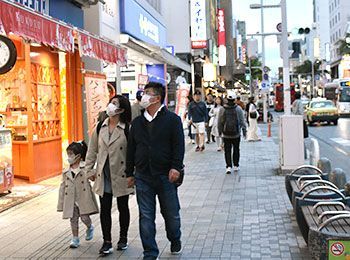“There’s no end in sight” 1,000 reservations from China visitors to Okinawa cancelled due to the corona virus, many worry will lead to decrease in domestic tourism as well

A family wearing masks walking down Kokusai-dori in Naha February 4
February 5, 2020 Ryukyu Shimpo
The spread of a pneumonia brought about by the corona virus has had an ever-increasing impact on the global economy, and it has cast a large shadow over the economy of Okinawa, which had previously been enjoying continued growth in their tourism industry.
Okinawa regularly expects an influx of Chinese visitors with a large appetite for spending around the Lunar New Year, however due to the virus around 1,000 reservations were cancelled, creating a shocking dilemma for restaurants and other tourism businesses.
For companies such as Okinawa Kankou Kaihatsu, which operates the local restaurant chain Chinuman, which has locations at tourist destinations in places like Naha and Onna, around 30% of the customer base comes from people visiting the island from abroad. Kazumasa Yona, the company’s managing director, commented frustratingly, “There is also a decrease in Korean visitors, sales are down from 5-10% for January.
We expected things to return to last year’s levels with the Lunar New Year, but the cancellation of these reservations has had a considerable effect.”
If the effects of the contagion continues, there are worries that it will lead to domestic travelers avoiding visits to Okinawa, which has a reputation as a tourist destination that attracts many visitors from abroad. Yona added, “There’s no end in sight, which is frightening.”
The sight of group travelers from large cruise ships visiting on charter buses has also disappeared, and the foot traffic on Kokusai-dori has become sparse.
One business owner who developed multiple restaurants on Kokusai-dori said in dismay, “There have been over 2,000 cancellations from Chinese visitors since the end of January.
People are avoiding tourist destinations, and there have even been some cancellations from domestic group tours.”
A representative from a hotel in Naha that has a lot of guests from abroad dropped their shoulders, saying, “There have been no visitors from not only China, but also Korea.
It’s tough” They are looking at offering discounts to help with their occupancy rate.
Kikou Sakiyama, who manages the Okinawa branch of the All Nippon Travel Agents Association (ANTA), indicates, “If the effects are prolonged, it will become a matter of life or death for some businesses.
It will be especially tough for companies who specialize in tourism from China.”
Meanwhile, the Hotel Palm Royal Naha in Makishi, Naha, is still seeing substantial lodging from domestic visitors, and had a room occupancy ratio in January that out-performed the previous year.
Hotel general manager Naohisa Takakura said, “Lowering prices will not bring back customers.
In order to avoid a mid-to-long-term price collapse, you have to make sure that the level of service is top notch to ensure repeat visitors.”
The hotel made a deal with a company that produces masks, and has been providing them to customers free of charge at check-in.
The decrease in tourism has even led to a reduction in sales at retails stores such as supermarkets, department stores, and souvenir shops.
According to calculations released by Okinawa prefecture, Chinese visitors spend on average around 51,481 yen on souvenirs, over double the average amount for foreign visitors overall.
According to one person who works in the retail industry, “Even a 10% drop in tourism from China will have a massive effect on sales.”
At Aeon Ryukyu Department store, they started seeing a drop in Chinese customers in the latter half of January, and they reported a 10% decrease in tax-free sales compared to the previous year for the Lunar New Year.
A representative from the Ryubo Department store said “We get the impression that there is a decrease in Chinese customers.”
However, they were unable to compare their year-over-year figures for the Lunar New Year, which was in February last year, and were unable to comment if there was any effect from the corona virus.
The San-A supermarket, a major chain in Okinawa, reported that sales of masks were strong, and that their January tax-free sales were up year-over-year.
(English translation by T&CY and Sam Grieb)
Previous Article:Changing Sadness and Despair into Hope and Love Turning Hopes for Shuri Castle’s Reconstruction into Art
Next Article:Participants from Japan, South Korea, and Taiwan search for remains of Battle of Okinawa victims in Kenken, Motobu, wish for peace in East Asia
[Similar Articles]
- A reduction in tourist visitors to Okinawa due to coronavirus, anticipated to be around 500,000, could lead to a decrease in tourism revenue of 28.1 billion yen, cause 1,940 job losses
- Okinawa Wedding Committee hopes to develop the Chinese market with resort weddings, wedding albums, and special visas
- The disappearance of foreigners from the streets due to coronavirus continues to assail Okinawa’s economy, with travel agency sales – which rely heavily on Chinese patronage – dropping to almost “zero”
- Okinawa tourist arrivals hit 10 million beating record for seventh-consecutive year
- Lunar New Year tourists enjoy shopping sprees in Okinawa
 Webcam(Kokusai Street)
Webcam(Kokusai Street)


